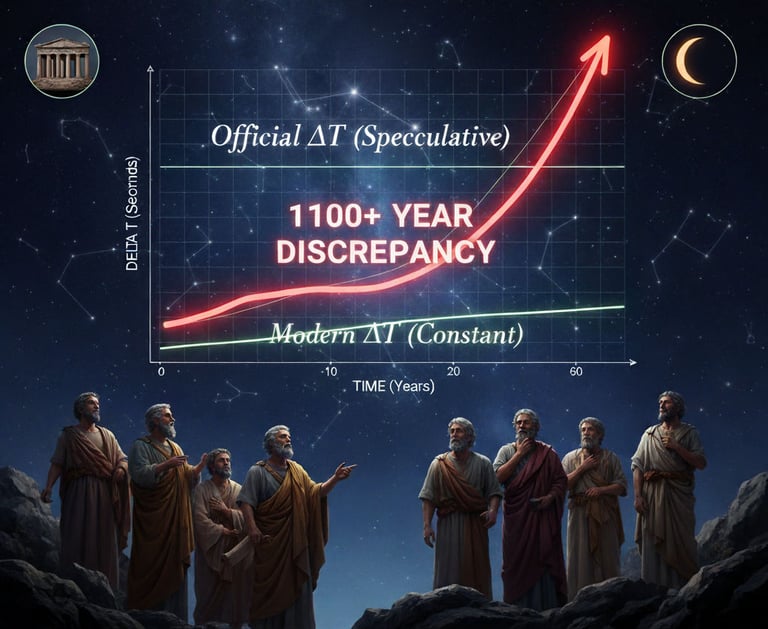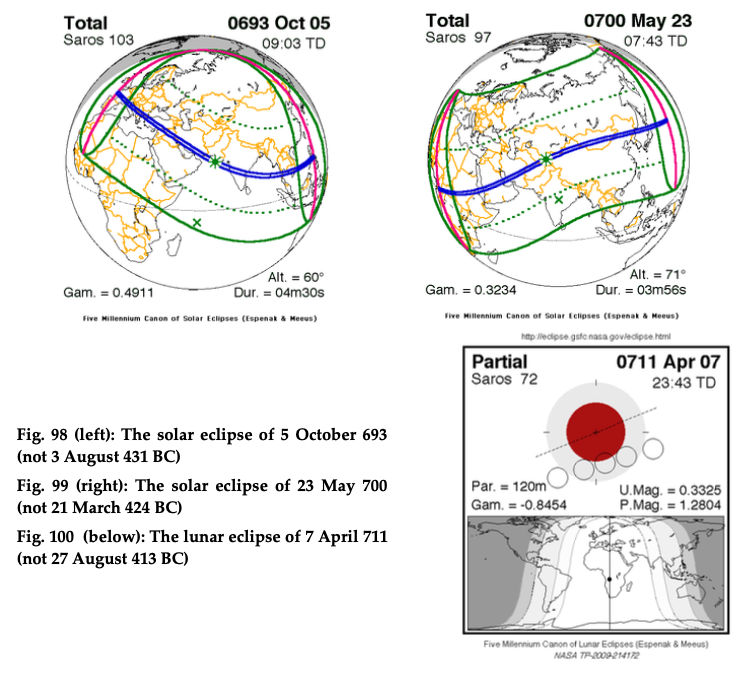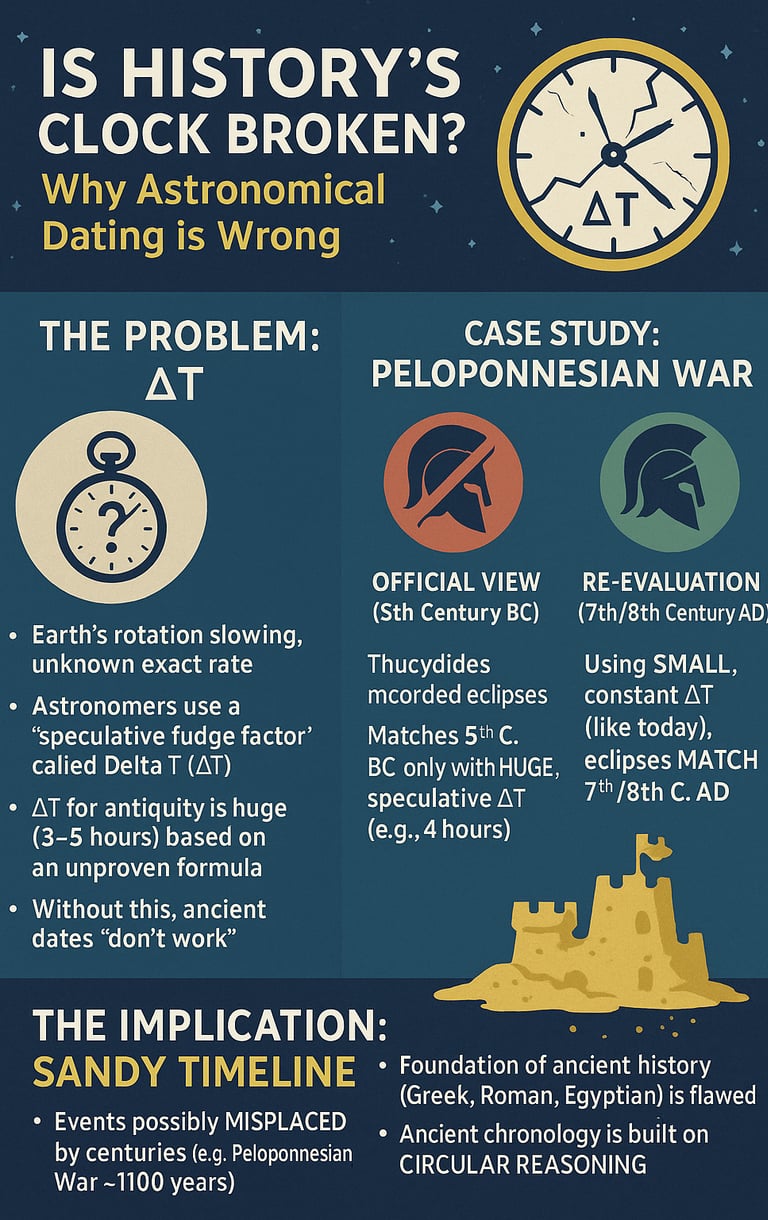Is History's Clock Broken? - Why Astronomical Dating is Wrong
This article challenges the validity of astronomical dating for ancient history, arguing that it relies on a speculative parameter known as Delta T (ΔT). This factor, which supposedly accounts for the slowing of Earth's rotation, is extrapolated into the past using unproven formulas, creating large, theoretical correction values. The article uses the Peloponnesian War as a case study, demonstrating that the eclipses recorded by Thucydides only match the official 5th-century BC date if a large, speculative Delta T is applied. Without this adjustment, the astronomical data instead points to a perfect match in the 7th-8th centuries AD. This suggests that foundational ancient events are misplaced by over 1,100 years and that the entire ancient timeline is built on a flawed and unscientific premise.
ESSENTIALS
8/17/20253 min read


For historians, the sky is the ultimate clock. While human records can be forged, biased, or lost, the movements of the heavens are seen as pure, mathematical, and unchangeable. Solar and lunar eclipses, recorded by ancient chroniclers, are considered the most reliable anchors we have—cosmic timestamps that lock events into a precise and un-fakeable timeline.
But what if this clock is wrong? Not the clock in the sky, but the one we use to interpret it. What if the entire science of astronomical dating is built on a single, unproven assumption? According to a radical re-evaluation of historical astronomy, this is exactly the case. The "rock-solid" dates of antiquity are nothing more than an illusion, created by a speculative fudge factor that, when removed, causes the entire ancient timeline to collapse.


The Historian's Dirty Secret: Delta T (ΔT)
The cornerstone of historical dating is the ability to calculate the exact time and place an ancient eclipse was visible. To do this, astronomers need to know the precise speed of the Earth's rotation at that point in the past. The problem? We don't. We know that the Earth's rotation is gradually slowing down, but we don't know the exact rate.
To "solve" this, astronomers created a speculative correction factor called Delta T (ΔT).
Think of it like an old watch that loses time. If you know it loses 1 second per day, you can calculate that after a year, it will be 365 seconds slow. Delta T is this accumulated error for the Earth's rotation. The problem is, while we can measure the error today (it's around 70 seconds), we have no way of knowing the exact rate of slowing 2,500 years ago.
To get around this, official science uses a speculative formula (ΔT=c⋅t2) that assumes the Earth's slowing has dramatically and continuously accelerated over time. This results in an enormous calculated Delta T for antiquity—often as high as 3 to 5 hours. Without this massive, purely theoretical adjustment, the official dates of history simply don't work.
Case Study: The Phantom War of the 5th Century BC
The most famous "astronomically dated" event of antiquity is the Peloponnesian War, chronicled by the historian Thucydides. He meticulously recorded several solar and lunar eclipses that occurred during the conflict, which official history places in the 5th century BC.
Here's the conspiracy:
To make the eclipses described by Thucydides visible in Athens in the 5th century BC, astronomers must apply a massive Delta T of nearly 4 hours. This speculative value is treated as a fact.
But what happens if you challenge that assumption? What if you calculate the eclipses using a small, constant Delta T, similar to the one we can actually measure today?
The result is staggering. The eclipses described by Thucydides were not visible in ancient Greece in the 5th century BC. The astronomical record simply does not match the historical one.
The investigation, however, doesn't stop there. Researchers searched the entire astronomical calendar for a time when a set of eclipses did match Thucydides' descriptions, as seen from Greece, using a small, non-speculative Delta T. They found a perfect match. The only problem? The dates were not in the 5th century BC. They were in the 7th and 8th centuries AD.


A Timeline Built on Sand
The implication of this discovery is earth-shattering. The Peloponnesian War, a foundational event of the classical world, appears to be a medieval event, misplaced in our timeline by over 1,100 years. The "unfakeable" astronomical anchor, when stripped of its speculative fudge factor, proves the official date is wrong.
This isn't just about one war. The same Delta T assumption is used to date countless other events in Egyptian, Babylonian, and Roman history. If the anchor point is wrong, then the entire chain of ancient chronology is broken. It suggests that our understanding of antiquity is not based on solid science, but on a circular argument where speculative physics are used to "prove" a pre-determined historical timeline.
The sky, it turns out, doesn't lie. But the methods used to interpret it might. The great conspiracy isn't that history was forged, but that it was forced to fit a fundamentally broken clock.


